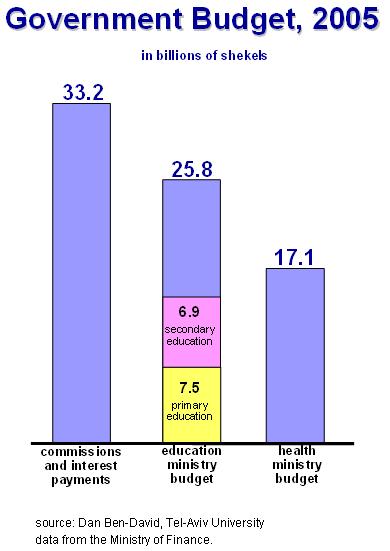|
PDF file
published
in Haaretz on June 12, 2006.
Education or Interest
by Dan Ben-David It’s budget-building season, and this
year brings with it good tidings: the country is coming out of the recession
and there is money available. This is
the sort of reality that beckons many MKs and cabinet ministers – and leading
them is Defense Minister Amir Peretz who announced, “the citizens of Israel
need both welfare and security and in these days of budget surplus, there is no
reason to continue cutting the defense budget” (Ynet, May 29). Is that so? One of the so-called stylized facts
that characterizes growth paths is their steadiness over decades. Along a growth path, there are periods of
recession and subsequent boom periods that repeat themselves over time, or
“business cycles” as they are commonly referred to. When a country enters a recession, the
decline in economic activity leads to lower tax revenues for the government. The recession is then followed by boom years
in which the economy returns to its long-run growth path. The greater the increase in economic activity,
the greater the tax revenues. If the government were to adjust its
expenditures to its income in each year, it would have to cut its spending
during recessionary periods in which aid is much more in demand, and behave in
just the opposite manner during periods of economic boom. Therefore, the government’s goal should not
be to balance its budget on an annual basis but to adhere to a stable spending
path with deficits in lean years and surpluses in good years. This has non-negligible implications regarding
budget responsibility over time. But the mentality here is that in
tough times the government must step in and provide assistance while in easier
times there are surpluses that it is a shame not to utilize, as Defense
Minister Peretz so succinctly stated. This
type of world-view has led to the situation depicted in the graph – a picture
that needs to be branded in the minds of every politician and every citizen who
has the right to vote. A government is no different than a
household. There are incomes (primarily
from taxes) and there are expenditures. If
expenditures exceed incomes, then it is necessary to borrow money. When one takes out loans, then the day of
reckoning eventually comes and the loans need to be repaid – with interest. A very substantial portion of each
year’s national budget goes toward repayment of the principal. However, beyond having to return the money
that we borrowed, we are also obligated to pay a “penalty” on our inability –
or our lack of willingness – to live within our means. This “penalty” is reflected in the portion of
the budget that is channeled toward interest payments at the nearly
unimaginable level of 33 billion NIS last year alone. For those who do not fully comprehend
the dimensions of this expenditure, we are basically throwing away an amount
that is 29% greater than the entire education budget, and 2.3 times as much as
the combined budget for primary and secondary education. As irony would have it, in a country who
interest payments are twice the entire health budget, there are insufficient
funds in that same budget to fund a normal medicine basket that would allow a
decent quality of life for our ill and ailing. The time has come to make the
transition from budget wantonness to national responsibility and accountability. There are no separate, more convenient, economic
laws for those who do not understand basic concepts such as “budget constraint”. Whoever wants more education, health and
welfare needs to understand that if we pay less interest each year, there will
be more funds available for the true needs of Israeli society. This requires that in good years we utilize
the surpluses to reduce the national debt – and that necessitates that our
elected representatives determine a new set of national priorities that
represents a wiser distribution of our limited budget. comments
to:
danib@post.tau.ac.il
|
